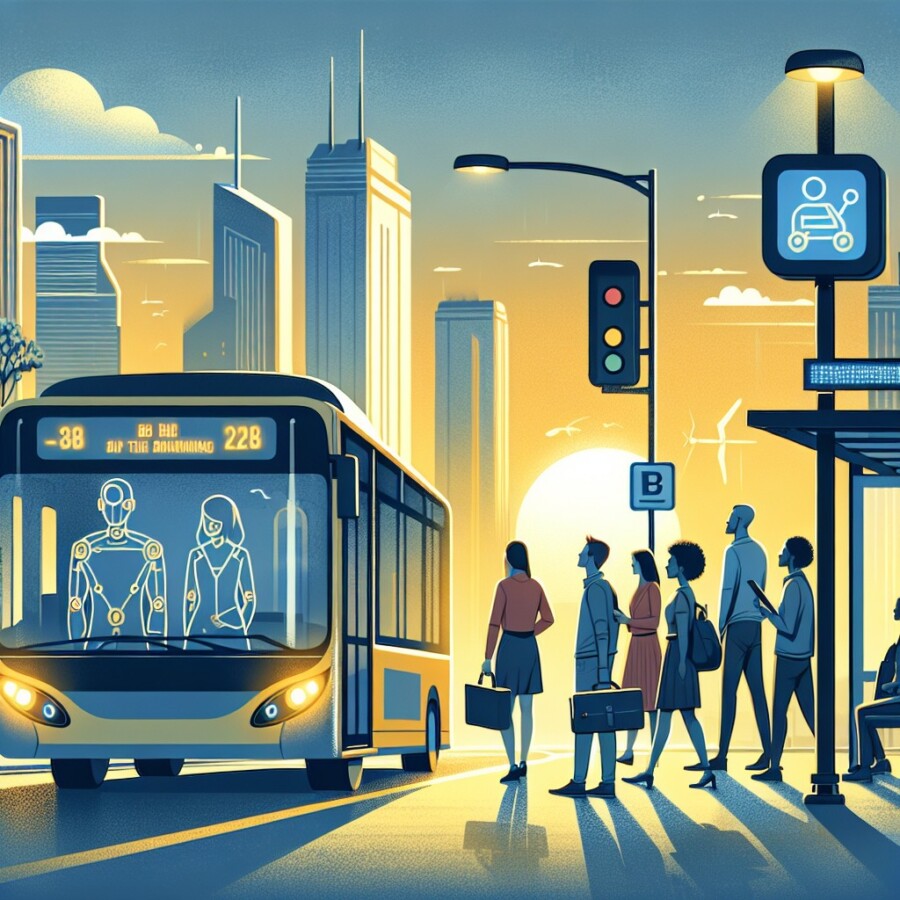A bus company in the UK is using smart computer programs to fix a problem where buses arrive at the same time instead of being spread out. They are changing their bus schedules more often using this program, which looks at things like traffic. This new way has made buses arrive on time 20% more often when it’s very busy. The company wants to use this smart program for all their buses in the UK.
The smart program comes from a company in London. It learns from lots of information, like where the buses are and when people buy tickets. The boss of the company says they also have to think about when to charge electric buses and how to move buses in and out of the places where they are kept. All around the world, other companies are starting to use smart programs to make bus and minibus routes better.
But, experts say it’s very important that the bus schedules are right and easy for people to understand. A group that wants better bus service says the schedules should be good for the people who use them. Another group that watches over transport says that bus companies need to tell people well if there are any changes.
Original news source: How AI is helping to prevent three buses turning up at once (BBC)
🎧 Listen:
Slow
Normal
Fast
📖 Vocabulary:
| 1 | smart | Clever or good at solving problems |
| 2 | schedules | Plans that show when something will happen |
| 3 | traffic | Cars and trucks moving on the roads |
| 4 | program | A set of instructions that a computer follows |
| 5 | tickets | Small pieces of paper that show you paid to go somewhere |
| 6 | charge | To give power to something, like a battery |
| 7 | electric | Using electricity to work |
| 8 | routes | Paths or directions to get from one place to another |
| 9 | experts | People who know a lot about a certain thing |
| 10 | transport | Moving people or things from one place to another |
| 11 | service | Help or work that is given to others |
| 12 | changes | Things that become different |
Group or Classroom Activities
Warm-up Activities:
– Charades
Instructions: Divide the class into two teams. Write key vocabulary words from the article on separate slips of paper and put them in a bowl. One student from each team will come to the front of the class and pick a slip of paper. Without speaking, they must act out the word or phrase for their team to guess. The team that guesses correctly gets a point. Continue until all the slips of paper have been used, and the team with the most points wins.
– News Summary
Instructions: In pairs, students will take turns summarizing the main points of the article to their partner. After each summary, the partner will provide feedback and ask questions to ensure understanding. Then, the roles will switch and the other student will summarize the article. Encourage students to use their own words and focus on the key information.
– Opinion Poll
Instructions: Divide the class into small groups. Each group will come up with three statements related to the article, such as “Using smart programs to improve bus schedules is a good idea.” Each student in the group will then rate their agreement with each statement on a scale of 1-5 (1 being strongly disagree and 5 being strongly agree). After everyone has rated the statements, each group will share their results and discuss their reasons for their ratings.
– Vocabulary Pictionary
Instructions: Write key vocabulary words from the article on the board or on separate slips of paper. Divide the class into pairs. One student will select a word and draw a picture to represent it, while their partner tries to guess the word. The pair will switch roles after each word. Encourage students to use their imagination and creativity to represent the words visually.
– Future Predictions
Instructions: In pairs, students will take turns making predictions about the future of bus scheduling based on the information in the article. They should consider the potential benefits and challenges of using smart programs, as well as any other factors they think may impact bus schedules in the future. After each prediction, the partner can provide feedback and ask follow-up questions for clarification.
🤔 Comprehension Questions:
1. How is the bus company in the UK using smart computer programs?
2. What does the smart program look at to help fix the problem of buses arriving at the same time?
3. How much more often do buses arrive on time when it’s very busy?
4. Where does the smart program come from?
5. What kind of information does the smart program learn from?
6. What are some other things the boss of the company has to think about?
7. Why do experts say it’s important for bus schedules to be right and easy to understand?
Go to answers ⇩
🎧✍️ Listen and Fill in the Gaps:
A bus (1)______ in the UK is using smart computer (2)______s to fix a (3)______ where buses arrive at the same time instead of being spread out. They are changing their bus schedules more often using this program, which looks at things like traffic. This new way has made buses arrive on time 20% more often when it’s very busy. The company wants to use this smart program for all their (4)______ in the UK.
The smart program comes from a company in (5)______. It learns from lots of information, like where the buses are and when people buy (6)______. The boss of the company says they also have to think about when to charge (7)______ buses and how to move buses in and out of the places where they are kept. All around the world, other companies are starting to use smart (8)______ to make bus and minibus (9)______ better.
But, experts say it’s very important that the bus schedules are right and easy for people to understand. A group that (10)______ better bus service (11)______ the schedules should be good for the people who use them. Another group that (12)______ over transport says that bus companies need to tell people well if there are any changes.
Go to answers ⇩
💬 Discussion Questions:
Students can ask a partner these questions, or discuss them as a group.
1. What is a smart computer program?
2. How would you feel if the buses always arrived at the same time?
3. Do you like the idea of changing bus schedules more often? Why or why not?
4. What do you think about using smart programs to make bus routes better?
5. How do you think the smart program learns from lots of information?
6. Do you think it’s important for bus schedules to be easy for people to understand? Why or why not?
7. What do you think about the idea of charging electric buses at certain times?
8. How do you think the bus company can move buses in and out of the places where they are kept?
9. Do you think it’s important for bus companies to inform people about any changes in the schedules? Why or why not?
10. What is one thing you would change about the bus service in your city?
11. How do you think smart programs can improve transportation in general?
12. Have you ever used a smart program for anything? If so, what was it and how did it help you?
Individual Activities
📖💭 Vocabulary Meanings:
Match each word to its meaning.
Words:
1. smart
2. schedules
3. traffic
4. program
5. tickets
6. charge
7. electric
8. routes
9. experts
10. transport
11. service
12. changes
Meanings:
(A) Plans that show when something will happen
(B) People who know a lot about a certain thing
(C) Paths or directions to get from one place to another
(D) Using electricity to work
(E) Moving people or things from one place to another
(F) To give power to something, like a battery
(G) Help or work that is given to others
(H) Things that become different
(I) Cars and trucks moving on the roads
(J) A set of instructions that a computer follows
(K) Small pieces of paper that show you paid to go somewhere
(L) Clever or good at solving problems
Go to answers ⇩
🔡 Multiple Choice Questions:
1. What problem is the bus company in the UK trying to fix?
(a) Buses arriving at the same time
(b) Buses arriving late
(c) Buses arriving early
(d) Buses not arriving at all
2. How has the smart program improved bus arrival times?
(a) Buses arrive on time 10% more often
(b) Buses arrive on time 20% more often
(c) Buses arrive on time 30% more often
(d) Buses arrive on time 50% more often
3. Where does the smart program come from?
(a) New York
(b) London
(c) Paris
(d) Tokyo
4. What kind of information does the smart program learn from?
(a) Where the buses are and when people buy tickets
(b) The weather and the time of day
(c) The color of the buses and the drivers’ names
(d) The price of the tickets and the passengers’ ages
5. What other things do the bus company have to think about besides bus schedules?
(a) Painting the buses and cleaning the windows
(b) Hiring more drivers and buying new buses
(c) Changing the bus company’s name and logo
(d) Charging electric buses and moving buses in and out of the places where they are kept
6. Why is it important for bus schedules to be right and easy to understand?
(a) So that the buses can arrive faster
(b) So that the bus company can make more money
(c) So that the bus drivers can have more breaks
(d) So that people can plan their journeys properly
7. What does the group that wants better bus service say about the schedules?
(a) They should be good for the bus drivers
(b) They should be good for the bus company’s profits
(c) They should be good for the people who use them
(d) They should be good for the government
8. What does the group that watches over transport say bus companies need to do?
(a) Keep the schedules a secret
(b) Only make changes to the schedules on weekends
(c) Tell people well if there are any changes
(d) Charge higher ticket prices
Go to answers ⇩
🕵️ True or False Questions:
1. The bus company doesn’t want to use this smart program for all their buses in the UK.
2. The boss of the company also has to think about when to charge electric buses and how to move buses in and out of their storage places.
3. This new program has made buses arrive on time 20% more often during busy times.
4. Other companies around the world aren’t starting to use smart programs to improve bus routes.
5. A bus company in the UK is using smart computer programs to help solve a problem with buses arriving at the same time.
6. The smart program comes from a company in London and learns from lots of information, like where the buses are and when people buy tickets.
7. The program doesn’t look at things like traffic to change bus schedules more often.
8. Experts say it’s not important for bus schedules to be easy to understand and for bus companies to inform people about any changes.
Go to answers ⇩
📝 Write a Summary:
Write a summary of this news article in two sentences.
Check your writing now with the best free AI for English writing!
Writing Questions:
Answer the following questions. Write as much as you can for each answer.
Check your answers with our free English writing assistant!
1. How are smart computer programs being used to fix a problem with buses in the UK?
2. What does the smart program learn from to help improve bus schedules?
3. Why is it important for bus schedules to be right and easy for people to understand?
4. What are some other companies around the world starting to use smart programs for?
5. What do experts say bus companies need to do if there are any changes to the bus schedules?
✅ Answers
🤔✅ Comprehension Question Answers:
1. The bus company in the UK is using smart computer programs to change their bus schedules more often.
2. The smart program looks at things like traffic to help fix the problem of buses arriving at the same time.
3. Buses arrive on time 20% more often when it’s very busy.
4. The smart program comes from a company in London.
5. The smart program learns from lots of information, like where the buses are and when people buy tickets.
6. The boss of the company also has to think about when to charge electric buses and how to move buses in and out of the places where they are kept.
7. Experts say it’s important for bus schedules to be right and easy to understand because they should be good for the people who use them and bus companies need to tell people well if there are any changes.
Go back to questions ⇧
🎧✍️✅ Listen and Fill in the Gaps Answers:
(1) company
(2) program
(3) problem
(4) buses
(5) London
(6) tickets
(7) electric
(8) programs
(9) routes
(10) wants
(11) says
(12) watches
Go back to questions ⇧
📖💭✅ Vocabulary Meanings Answers:
1. smart
Answer: (L) Clever or good at solving problems
2. schedules
Answer: (A) Plans that show when something will happen
3. traffic
Answer: (I) Cars and trucks moving on the roads
4. program
Answer: (J) A set of instructions that a computer follows
5. tickets
Answer: (K) Small pieces of paper that show you paid to go somewhere
6. charge
Answer: (F) To give power to something, like a battery
7. electric
Answer: (D) Using electricity to work
8. routes
Answer: (C) Paths or directions to get from one place to another
9. experts
Answer: (B) People who know a lot about a certain thing
10. transport
Answer: (E) Moving people or things from one place to another
11. service
Answer: (G) Help or work that is given to others
12. changes
Answer: (H) Things that become different
Go back to questions ⇧
🔡✅ Multiple Choice Answers:
1. What problem is the bus company in the UK trying to fix?
Answer: (a) Buses arriving at the same time
2. How has the smart program improved bus arrival times?
Answer: (b) Buses arrive on time 20% more often
3. Where does the smart program come from?
Answer: (b) London
4. What kind of information does the smart program learn from?
Answer: (a) Where the buses are and when people buy tickets
5. What other things do the bus company have to think about besides bus schedules?
Answer: (d) Charging electric buses and moving buses in and out of the places where they are kept
6. Why is it important for bus schedules to be right and easy to understand?
Answer: (d) So that people can plan their journeys properly
7. What does the group that wants better bus service say about the schedules?
Answer: (c) They should be good for the people who use them
8. What does the group that watches over transport say bus companies need to do?
Answer: (c) Tell people well if there are any changes
Go back to questions ⇧
🕵️✅ True or False Answers:
1. The bus company doesn’t want to use this smart program for all their buses in the UK. (Answer: False)
2. The boss of the company also has to think about when to charge electric buses and how to move buses in and out of their storage places. (Answer: True)
3. This new program has made buses arrive on time 20% more often during busy times. (Answer: True)
4. Other companies around the world aren’t starting to use smart programs to improve bus routes. (Answer: False)
5. A bus company in the UK is using smart computer programs to help solve a problem with buses arriving at the same time. (Answer: True)
6. The smart program comes from a company in London and learns from lots of information, like where the buses are and when people buy tickets. (Answer: True)
7. The program doesn’t look at things like traffic to change bus schedules more often. (Answer: False)
8. Experts say it’s not important for bus schedules to be easy to understand and for bus companies to inform people about any changes. (Answer: False)
Go back to questions ⇧













